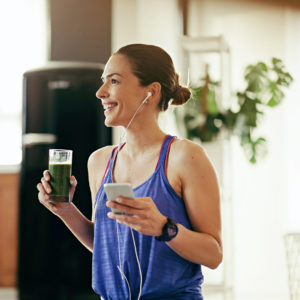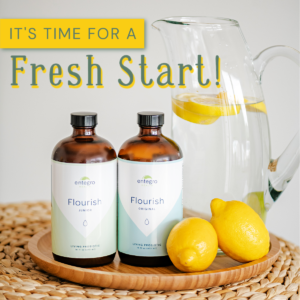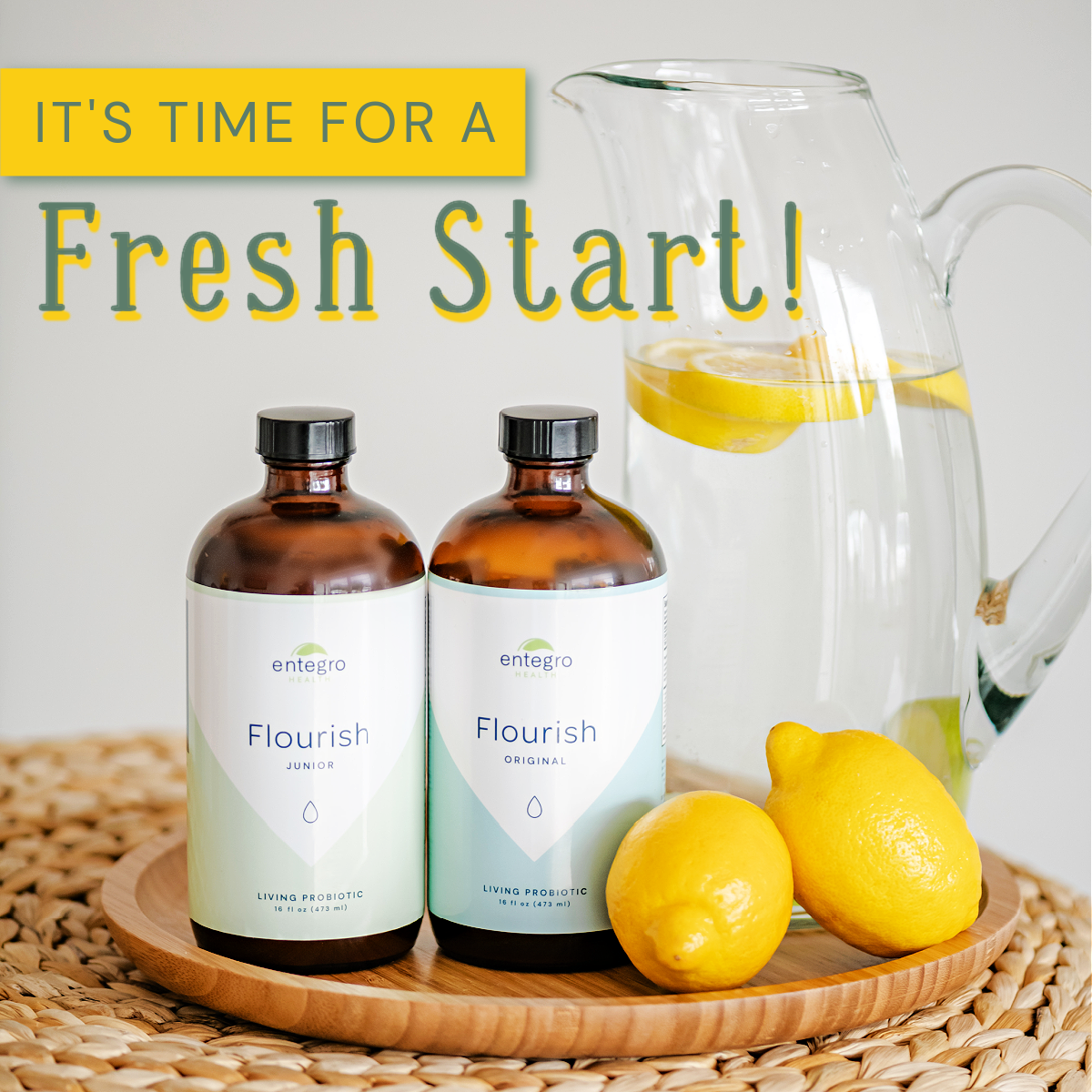Simple Gut-Friendly Habits
Small changes add up to big differences.
It’s the long-awaited new year with big expectations. Time to put in the effort and make some simple changes that will help you and your millions of bacterial friends.
Before making even small changes, it’s important to be aware of a few things.
Recognize the Choices –
The thing about habits is… whether they are good or bad, they make us feel comfortable. Most of the time we don’t even know they’re there until they are interrupted.

Recognize the Challenge –
Just because they are simple changes, it doesn’t mean they are easy! Come in with a plan and gradually add to it for long-term success.
Recognize the Why –
Having a healthy gut means better health for the entire body. Research continues to show the connection between the gut and immune system, brain, skin, multiple organs, and so much more. Choosing to keep a healthy gut will make a world of difference to the entire body.
1. Say no to artificial sweeteners (or at least try to back off )
Diet Rite was the first diet drink to hit the market in 1958, followed by the recently defuncted Tab in 1963. Since then, the American market has been gaga over low-calorie beverages sweetened by artificial sweeteners like Aspartame, Saccharin, Stevia, and Sucralose. One of the reasons why these artificial sweeteners were so highly regarded was because they were considered good for teeth. Bacteria are not able to utilize the artificial sweetener residue because there is nothing for them to eat. However, gut health and the oral microbiome are closely related. These artificial sweeteners can mess with the gut microbiome and the critical metabolites they produce. Because artificial sweeteners are 200+ times sweeter than sugar, these extremes may have contributed to the American palate becoming accustomed to and now preferring sweeter sweets.
2. Curb the use of alcohol
In chronic and/or large amounts, alcohol and the metabolites produced during the processing of it can overwhelm the gastrointestinal tract and liver. This leads to inflammation and damage both in the GI tract and throughout the body.1 The GI is the first line of defense to anything from the outside world making it a key player in the metabolism of alcohol, as well as the first to be damaged from a few too many.
Current CDC guidelines recommend up to one drink a day for women or up to two drinks a day for men, for adults over 21.
Some tips on cutting back include:
- Try a low-alcohol or alcohol-free alternative
- Set a budget to spend on alcohol for the month. One that challenges you
- Find a buddy and try a sober month together
3. Replace drinking with a new hobby: movement! 
Instead of meeting up with a friend to have a drink, try grabbing a pair of sneakers instead. Hit the road for a walk outside, or meet up at the gym for a class or buddy training session. Studies correlate the gut microbiome of exercisers to have greater diversity and a greater number of bacteria known for producing the beneficial short-chain fatty acid butyrate.3 This function may influence the gut, immune system, and others in beneficial ways. Although the mechanism is not fully understood, the benefits are welcomed.
Adding in even just one bout of exercise a week can make a difference!
4. Drugs and the GI
This category is more of an awareness piece. As always, follow your health care provider’s instructions.
Both pharmaceuticals and over-the-counter (OTC) drugs have been shown to alter the gut microbiome, not just the antibiotics.5 Different classifications of drugs often have a similar impact on the GI. By being aware of the impact on the GI and gut microbiome, you can be prepared to navigate those challenges.
Constipation causing – antihypertensive, some cholesterol medications, iron, narcotic pain killers, and some antacids.
Diarrhea causing – most antibiotics.
Reflux causing – beta-blocker heart drugs, NSAIDs/Ibuprofen, some birth control medications, and oral antibiotics.
Again, follow your healthcare provider’s advice. However, perhaps there are times we don’t need to reach for the medicine cabinet to ease minor pain. Trying to find the root cause may solve the problem long term and not just cover up the symptoms.
5. Catch a few more Z’s.
Research is showing the gut microbiome and sleep influence each other – they are bidirectional. Regular disturbance of natural circadian rhythm due to sleep loss leads to changes in the gut microbiome bacteria in type and amount. The metabolites they produce are changed, which leads to changes throughout the body. Similarly, disturbances to the bacteria in the gut microbiome lead to changes in the metabolites produced in the bacteria. These changes can negatively impact the central nervous system (CNS) causing disturbed sleep cycles. Just another example of taking care of your microbiome and they will take care of you. 
Making sleep a priority can be a challenge as there are so many things that vie for our attention. And because Netflix automatically begins the next episode without prompting. The goal is 7-8 hours of sleep for adults, which, depending on what your normal is, could sound like an insurmountable goal. Just start by adding in 15 minutes a night for a week or two. Pay attention to your body and see if you notice a difference.
A few ideas to make going to bed a little easier if falling asleep can be difficult:
- Limit screen time before bed
- Avoid caffeine in the afternoon, or as I like to think of it in a positive way, take in your caffeine in the morning
- This one hurts to say – avoid mid-day napping
- Exercise – preferably in the morning or early afternoon. A good workout requires the body to recover – motivation for the body to sleep
Written by Lorilyn Van Dyke, Entegro Health
The content in this post is not intended to be a substitute for professional medical advice, diagnosis, or treatment. Always seek the advice of your physician or other qualified health provider with any questions you may have regarding a medical condition.
- Bishehsari, F., Magno, E., Swanson, G., Desai, V., Voigt, R. M., Forsyth, C. B., & Keshavarzian, A. (2017). Alcohol and Gut-Derived Inflammation. Alcohol research : current reviews, 38(2), 163–171.
- https://www.cdc.gov/alcohol/fact-sheets/moderate-drinking.htm#:~:text=To%20reduce%20the%20risk%20of,adults%20of%20legal%20drinking%20age
- https://journals.lww.com/acsm-essr/fulltext/2019/04000/exercise_and_the_gut_microbiome__a_review_of_the.4.aspx
- Li, Y., Hao, Y., Fan, F., & Zhang, B. (2018). The Role of Microbiome in Insomnia, Circadian Disturbance and Depression. Frontiers in psychiatry, 9, 669. https://doi.org/10.3389/fpsyt.2018.00669
- Maier, L., Pruteanu, M., Kuhn, M., Zeller, G., Telzerow, A., Anderson, E. E., Brochado, A. R., Fernandez, K. C., Dose, H., Mori, H., Patil, K. R., Bork, P., & Typas, A. (2018). Extensive impact of non-antibiotic drugs on human gut bacteria. Nature, 555(7698), 623–628. https://doi.org/10.1038/nature25979

 New customers! Get 11% OFF your first Flourish order with Code FRESHSTART11
New customers! Get 11% OFF your first Flourish order with Code FRESHSTART11